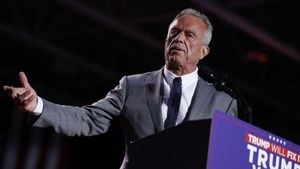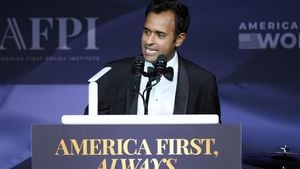Robert F. Kennedy Jr. finds himself at the crossroads of two powerful factions: anti-abortion advocates and proponents of reproductive rights. His recent appointment as Secretary of Health and Human Services (HHS) by President-elect Donald Trump has ignited fierce debate across the political spectrum, exposing the strains within Trump’s GOP and testing the waters of Kennedy's own political credibility.
Initially known for his controversial stances on vaccines and raw milk, Kennedy’s remarks about abortion have complicated his position. Just as he was appointed to this pivotal role, leaders from both sides of the abortion rights issue took to social media, voicing concerns about his contradictory views on reproductive health. On one hand, his support for Roe v. Wade and statements advocating choice suggest he is pro-abortion rights; on the other, past statements and flirtations with stricter regulations raise alarm bells among advocates for reproductive freedom.
During his run for presidency, Kennedy proclaimed he was “for choice and medical freedom,” which endeared him to liberal supporters initially. Yet his subsequent conversations with Trump—and declarations about national abortion bans have sown doubt among these same supporters. Former Vice President Mike Pence, representing the conservative side, echoed similar fears. He argued, through his organization Advancing American Freedom, against Kennedy’s nomination, calling it “an abrupt departure from the pro-life record of our administration.” Pence sharply criticized the potential of having the “most pro-abortion Republican” leading HHS, stressing the need for consistency and clarity among GOP policymakers.
While Pence and others pushed back with public condemnation, Kennedy’s camp is taking steps to placate anti-abortion groups, acknowledging their pivotal role in securing his Senate confirmation. Recognizing the knife-edge of support he’s perched upon, Kennedy is gearing up to appease these critics. Anti-abortion lobbyists have two clear demands: appoint someone with proven anti-abortion credentials to his senior staff and publicly affirm his commitment to shoring up Trump-era policies on abortion access.
Dialing down the potential backlash, RFK Jr. appears open to negotiating terms. Insiders close to him maintain he is largely focused on public health policies, hinting his own leanings on abortion may be influenced by whomever he chooses to put on his HHS team. Amid this maneuvering, Sen. James Lankford (R-Okla.), already skeptical of Kennedy’s position, stated he needs to see a reflection of prior GOP priorities and asked, “I want to know if the second Trump administration will have the same life perspective at HHS.”
The Biden administration's alterations to healthcare policies—expanding abortion access through updated HIPAA rules and making abortion pills easier to obtain—are under scrutiny. Anti-abortion groups have made it clear they desire the swift retraction of these rules and the reinstatement of Trump-era measures, including the Mexico City Policy, which restricts federal funding for organizations involved with abortion abroad.
Brent Leatherwood, the president of the Ethics and Religious Liberty Commission, underscored their insistence on repealing such expansions, stating they eagerly await “the day when the abortion pill is recognized for the evil it is and prohibited.” This sentiment echoes through the ranks of Kennedy’s critics and indicates a coordinated front among anti-abortion leaders pressing for stringent regulations on abortion access.
Yet the tension doesn’t stop there. Even pro-choice supporters have voiced skepticism about Kennedy, uneasy with his potential wavering on reproductive health policies. Groups like Reproductive Freedom for All have pointed out past statements where Kennedy signaled support for national abortion restrictions. They argue he cannot be trusted to safeguard reproductive freedom, calling his commitment to women’s healthcare questionable at best.
Some see the possibility of Kennedy trying to navigate these choppy waters as indicative of his aspirations for broader reconciliation within party lines. Some anti-abortion organizations remain somewhat hopeful. Students for Life of America, who have been less harshly outspoken against Kennedy, openly believe his openness to reconsider his previous stances is promising, stating, “When faced with evidence, he changed his views.” They commend him for adaptability and see this as indicative of his potential to align more closely with the movement moving forward.
The backdrop of this complex political dance doesn’t just outline differences on abortion—it raises questions about Kennedy’s capacity to lead and the ramifications of his leadership for healthcare policy moving forward. With abortion access being at the forefront of public debate and emotional sentiment, Kennedy’s nomination is poised to redefine the HHS’s role within the wider political and societal framework.
RFK Jr.’s history and nuances around this heated issue will not only affect his Senate confirmation but shape the conservative agenda as the Republican Party pivots toward future elections. Is he the necessary bridge to conquer the conflicting ideologies within his party, or will he be swayed by the loud voices on either side? Only time will tell as the Senate gears up to judge his qualifications, intentions, and the consequential policies they might pave the way for going forward.



